- cross-posted to:
- fuck_ai
- cross-posted to:
- fuck_ai
The research from Purdue University, first spotted by news outlet Futurism, was presented earlier this month at the Computer-Human Interaction Conference in Hawaii and looked at 517 programming questions on Stack Overflow that were then fed to ChatGPT.
“Our analysis shows that 52% of ChatGPT answers contain incorrect information and 77% are verbose,” the new study explained. “Nonetheless, our user study participants still preferred ChatGPT answers 35% of the time due to their comprehensiveness and well-articulated language style.”
Disturbingly, programmers in the study didn’t always catch the mistakes being produced by the AI chatbot.
“However, they also overlooked the misinformation in the ChatGPT answers 39% of the time,” according to the study. “This implies the need to counter misinformation in ChatGPT answers to programming questions and raise awareness of the risks associated with seemingly correct answers.”



It’s also “discovered” multitudes more that are complete nonsense.
Yeah, that’s the nature of discovery. Humans also “discovery” tons of things like chess strategies that are complete nonsense. Over time, we discard the most nonsense ones and keep the good ones as best as we can. It just turns out that this process is done way faster and efficiently by machines. That’s why nobody thinks humans are going to surpass AI at chess, go, poker, protein folding, matrix multiplation algorithm creation, and a whole bunch of other things.
Can you provide a source for the claim that all these discoveries are “far superior” than what humans have discovered? I struggle to see how a discovery can be ‘superior’- isn’t how the discovery is classified and dealt with, the crucial aspect?
I mean in these fields, it is superior. The greatest chess player is an AI. The greatest GO player is an AI. The greatest poker player… So far as Matrix multiplication goes, there are numerous examples of mathematicians being stuck at finding methods to do it at a certain level of efficiency and then having AI come through and finding more efficient ways to do it for given matrix sizes. Similar to this is drug creation and protein folding. The list goes on and on. I wasn’t comparing discoveries across fields, I’m just saying in clearly measurable specific fields, AI has objectively surpassed humans, and it has become pretty routine for this to be the case.
All these things I’ve mentioned are easily searchable, but if you still want sources after my clarification of my meaning let me know, and I’ll find some.